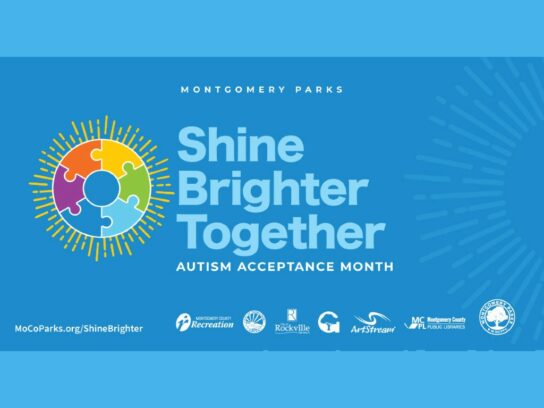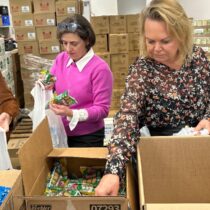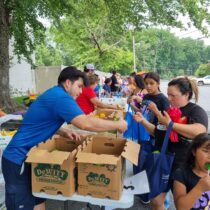
April is Autism Acceptance Month. Psychologist and researcher Dr. Bernard Rimland initiated the idea in 1970. Rimland co-founded the Autism Society of America.
The organization has 70 different affiliates around the country including a chapter in Maryland.
MCM spoke with Melissa Rosenberg Executive Director of the Autism Society of Maryland. She said the public should understand autism is a lifelong neurodevelopmental condition. People are born with it.
Autism is a spectrum disorder. “Each person with autism is very unique. Some people will need support throughout their lives while others will live very independently and then everything in-between,” Rosenberg said.
MCM also spoke with Kim Mayo who is the Administrator with the Community Support Network. The group is part of the County’s Health and Human Services Department (DHHS). She said people with autism have a different way of experiencing and engaging with the world.
“Every autistic individual brings unique strengths, perspectives, and talents that enrich our communities, workplaces, and schools,” Mayo said.
Signs and Symptoms
Autism often is diagnosed when children are very young, although diagnoses can happen later in life.
“Oftentimes children will have delayed speech or an atypical kind of speech pattern, maybe less eye contact. They may not socialize in a typical way,” Rosenberg said.
Mayo provided some telltale signs that infants and young children may exhibit. They include:
- Avoids or does not keep eye contact
- Does not respond to his or her name by 9 months of age
- Will not show facial expressions such as happy, sad, angry, and surprised by 9 months of age
- Does not play simple interactive games like pat-a-cake by 12 months of age
- Uses few or no gestures by 12 months of age (for example, does not wave goodbye)
- Does not point to show you something interesting by 18 months of age
- Will not notice when others are hurt or upset by 24 months of age
- Does not notice other children and join them in play by 36 months of age
- Does not sing, dance, or act for you by 60 months of age
Other behaviors also may appear in children such as:
- Lines up toys or other objects and gets upset when the order is changed
- Repeats words or phrases over and over
- Plays with toys the same way every time
- Gets upset by minor changes
- Has obsessive interests
- Must follow certain routines
- Flaps hands, rocks body, or spins self in circles
- Has unusual reactions to the way things sound, smell, taste, look, or feel
Autism Getting Renewed Attention
Autism has received a lot of attention lately in part because of additional focus from the federal government and Health and Human Services (HHS) Secretary, Robert F. Kennedy, Jr.
Earlier this month, HHS announced plans to research the causes of autism. Kennedy said he would have some answers by September. Autism advocates found Kennedy’s remarks unrealistic.
“You can’t do science-based research like you need to do in six months or less. We want science-based research that has high standards. That’s what should be happening,” Rosenberg said.
Kennedy also called autism “a preventable disease” and said an environmental toxin may be to blame.
Sean O’Donnell is the Deputy Chief for Public Health Services in the County’s Department of Health and Human Services. He said Kennedy’s statements are hurtful.
“This is particularly painful and an unfounded statement that stigmatizes individuals with autism as “diseased”. It is unfortunately consistent with a reductionist ideology that people cannot be born different, that external harmful factors are solely responsible for this diversity, and that these differences can and should be cured,” O’Donnell said.
Increase in Autism Cases
Kennedy’s comments came after the Centers for Disease Control and Prevention (CDC) announced an increase in autism cases around the country. The CDC report this month found 1 in 31 children under the age of 8 has autism. The report was based on numbers from 2022. Comparatively, in 2020, the CDC found 1 in 36 children had autism. Meanwhile, the current figures in Maryland show 1 in 38 children have autism based on 2022 numbers. That is up from 1 in 43 children in 2020.
Mayo reflected on why the country is seeing an increase in autism cases.
“We are better at recognizing and identifying autism in children. There has been enhanced education about autism for pediatricians and other medical specialists for early detection,” she said.
“We have better screening. Pediatricians are screening at 9 months, 18 months, and 24 months. We’re diagnosing more broadly,” Rosenberg said.
No Known Cause For Autism
But Kennedy dismissed those claims and said autism is growing at an alarming rate. While there is no known cause for autism, researchers have spent decades looking for answers.
“There’s been research going on across the country, around the world, and the initial results are pointing to a very strong genetic link. We often meet families with two, three or more children with autism. Then perhaps a parent, grandparent or relative also has autism,” Rosenberg said.
She said it is possible other causes like something in the environment may trigger autism, but nothing has been proven yet.
Autism Advocates Criticize Statements From Federal Government
Meantime, the director at the National Institutes of Health announced last week plans to create an Autism registry. It would collect and compile private information from several databases of patients. However, last Friday, an HHS official walked back the idea, and said the health department will not create a registry.
Rosenberg called recent developments and statements about autism coming from Washington D.C. “very troubling.”
She said if the government created an Autism registry, it would have the potential for misuse and would invade a person’s privacy.
“It also undermines the dignity of individuals with all disabilities, particularly autism. We really do advocate for science-based research that is transparent, that has standards, and that respects an individual’s privacy,” Rosenberg said.
More than half a dozen national organizations that advocate for the Autism community issued a statement in mid-April after Kennedy’s news conference. Kennedy had previously linked vaccines to autism before he became HHS Secretary.
The statement from the Autism groups reinforced that vaccines do not cause autism. “Decades of scientific research confirm there is no causal link. Public health messaging must be grounded in science and protect all communities. Public dialogue and policy must reflect the inherent value, rights, and diverse needs of autistic people,” the statement said.
“We are deeply concerned by growing public rhetoric and policy discussions that challenges these shared principles. Claims that autism is “preventable” are not supported by scientific consensus and perpetuate stigma. Language framing autism as a “chronic disease” a “childhood disease” or “epidemic” helps distort public understanding and undermines respect for autistic people. At the same time, proposals to reduce funding for programs like Medicaid, the Department of Education and the Administration for Community Living threaten the very services that autistic individuals and their families rely on,” the statement added.
Support Services Available
Rosenberg recommends parents concerned whether their child has Autism should first check with their pediatrician. The County has a number of support services for children and adults with autism.
Here are some resources:
- The Montgomery County Infants and Toddlers Program (MCITP) will provide early intervention services to assist families with their efforts to address their children’s developmental and special needs. The program will accept an infant or toddler (from birth to 34.5 months) who may have a developmental delay.
- Autism Waiver program offers waiver services for children aged 0-21 years approved for funding. Services provided are individual intensive support services, respite care, therapeutic integration services, family consultation services, adult life planning, and residential habilitation services.
- The Maryland Developmental Disabilities Administration (DDA) provides funding for home and community-based services to children and adults with autism and other intellectual/developmental disabilities for people eligible. Examples of services include residential, personal support and meaningful day services including employment support.
Rosenberg said the County school system offers a lot of great resources for children. However, other groups provide services such as the Partnership for Extraordinary Minds in Kensington and The Arc Montgomery County in Rockville. Another organization, Pathfinders for Autism, is located in Hunt Valley, Maryland.
Upcoming Water Safety Seminar
Meantime, the Autism Society of Maryland also provides programs and information. Rosenberg said one concern many parents of autistic children have is keeping them safe. Drowning is to blame for 91% of deaths in children 14 years old or younger with autism. Last year, six autistic children in Maryland drowned including two in Montgomery County.
On May 14, the Society will hold a webinar on water safety and wandering. Here is a link for more information on the webinar and a link to the Society’s home page:
https://autismsocietymd.org/event/webinar-water-safety-wandering-prevention/
https://autismsocietymd.org/


Comments are closed.